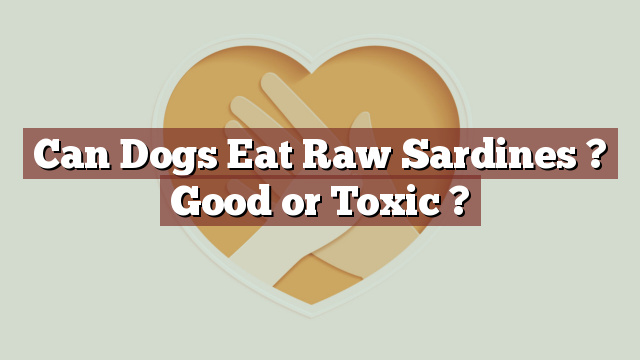Can Dogs Eat Raw Sardines? Good or Toxic?
Knowing what foods are safe for our furry friends is crucial for their overall well-being. As dog owners, it is important to be aware of the potential risks and benefits of different foods before incorporating them into our pets’ diets. One such food that often arises as a question is raw sardines. In this article, we will explore the nutritional value of raw sardines for dogs, discuss safety considerations, and analyze the potential risks and benefits of feeding dogs raw sardines.
Nutritional Value of Raw Sardines for Dogs
Raw sardines are packed with essential nutrients that can contribute to a dog’s overall health. They are an excellent source of protein, which is essential for muscle development and repair. Additionally, sardines are rich in omega-3 fatty acids, which support a healthy coat and skin, as well as promote brain and eye health. These fatty acids also possess anti-inflammatory properties, which can benefit dogs with certain health conditions.
Moreover, raw sardines contain vitamins and minerals such as vitamin D, vitamin B12, calcium, and selenium. These nutrients play a vital role in maintaining a dog’s immune system, bone health, and overall vitality.
Can Dogs Eat Raw Sardines? Safety Considerations
Yes, dogs can safely consume raw sardines as long as some safety considerations are taken into account. It is recommended to always feed dogs fresh and high-quality raw sardines sourced from reputable suppliers. Ensure that the sardines are properly cleaned and gutted to minimize the risk of any potential parasites or contamination.
Furthermore, it is important to feed the sardines in moderation. While sardines are nutritious, they should be considered as a treat or supplemental addition to a well-balanced diet. Excessive consumption of sardines can lead to an imbalance in a dog’s diet, as they do not provide all the necessary nutrients dogs require.
Potential Risks and Benefits of Feeding Dogs Raw Sardines
Feeding dogs raw sardines can have both risks and benefits. On the positive side, the omega-3 fatty acids found in sardines can provide numerous health benefits, including reducing inflammation, enhancing cognitive function, and promoting healthy skin and coat. Additionally, the protein content helps support muscle growth and repair.
However, it is important to be cautious of potential risks. Raw sardines may contain certain parasites, such as roundworms or tapeworms, which can be harmful to dogs if not properly addressed. It is crucial to freeze the sardines for at least two weeks before feeding them to your dog to kill any potential parasites. Regularly inspect the sardines for signs of spoilage or unusual smell, as consuming rotten fish can cause digestive issues.
What to Do If Your Dog Eats Raw Sardines
If your dog accidentally consumes raw sardines, there is usually no cause for immediate concern. However, if you notice any adverse reactions or signs of discomfort, it is recommended to contact your veterinarian for further guidance. It is always better to err on the side of caution and seek professional advice.
Conclusion: Raw Sardines as a Nutritious and Safe Addition to a Dog’s Diet
In conclusion, dogs can safely eat raw sardines, provided that proper precautions are taken. Raw sardines offer a wide range of nutritional benefits, including protein, omega-3 fatty acids, and essential vitamins and minerals. However, it is important to feed sardines in moderation and ensure they are sourced from reputable suppliers. Freezing the sardines before consumption can help eliminate potential parasites.
Remember, it is always advisable to consult with a veterinarian before introducing any new food into your dog’s diet, especially if your dog has any underlying health conditions or dietary restrictions. By understanding the nutritional value, safety considerations, and potential risks and benefits, we can make informed decisions regarding our beloved pets’ diets and ensure their well-being.
Thank you for investing your time in exploring [page_title] on Can-Eat.org. Our goal is to provide readers like you with thorough and reliable information about various dietary topics. Each article, including [page_title], stems from diligent research and a passion for understanding the nuances of our food choices. We believe that knowledge is a vital step towards making informed and healthy decisions. However, while "[page_title]" sheds light on its specific topic, it's crucial to remember that everyone's body reacts differently to foods and dietary changes. What might be beneficial for one person could have different effects on another. Before you consider integrating suggestions or insights from "[page_title]" into your diet, it's always wise to consult with a nutritionist or healthcare professional. Their specialized knowledge ensures that you're making choices best suited to your individual health needs. As you navigate [page_title], be mindful of potential allergies, intolerances, or unique dietary requirements you may have. No singular article can capture the vast diversity of human health, and individualized guidance is invaluable. The content provided in [page_title] serves as a general guide. It is not, by any means, a substitute for personalized medical or nutritional advice. Your health should always be the top priority, and professional guidance is the best path forward. In your journey towards a balanced and nutritious lifestyle, we hope that [page_title] serves as a helpful stepping stone. Remember, informed decisions lead to healthier outcomes. Thank you for trusting Can-Eat.org. Continue exploring, learning, and prioritizing your health. Cheers to a well-informed and healthier future!

